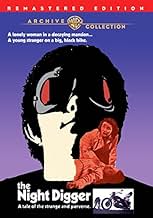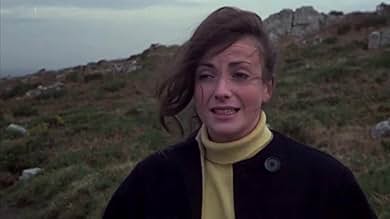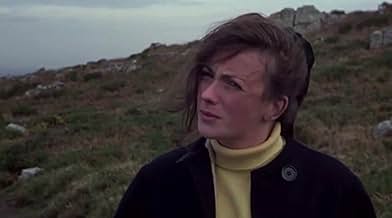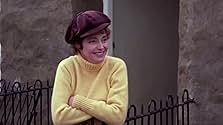IMDb RATING
6.3/10
1.4K
YOUR RATING
The dreary existence of middle-aged spinster Maura Prince takes an unexpected turn with the arrival of young handyman Billy Jarvis, but there is more to Billy than meets the eye.The dreary existence of middle-aged spinster Maura Prince takes an unexpected turn with the arrival of young handyman Billy Jarvis, but there is more to Billy than meets the eye.The dreary existence of middle-aged spinster Maura Prince takes an unexpected turn with the arrival of young handyman Billy Jarvis, but there is more to Billy than meets the eye.
- Director
- Writers
- All cast & crew
- Production, box office & more at IMDbPro
Featured reviews
In a isolated mansion outside of London, spinster Maura Prince (Patricia Neal) cares for her blind adoptive mother Mrs. Edith Prince (Pamela Brown). Dashing handyman Billy Jarvis (Nicholas Clay) shows up looking for work. Maura is frustrated that Edith has given her room to him and initially feels uncomfortable with his demeanor. There is a lady killer on the loose.
It's a fascinating juxtaposition between the stuffy English mentality and the glee about the demented violence. That old guy describing the series of missing women is hilarious. Patricia Neal is great. Billy is a disturbing character and getting naked only makes it even better. All that is missing is his brutal murders. The movie is cutting away from the kills. It's the era of its time. This is fascinating.
It's a fascinating juxtaposition between the stuffy English mentality and the glee about the demented violence. That old guy describing the series of missing women is hilarious. Patricia Neal is great. Billy is a disturbing character and getting naked only makes it even better. All that is missing is his brutal murders. The movie is cutting away from the kills. It's the era of its time. This is fascinating.
Middle-aged spinster Maura (Patricia Neal), the adopted daughter of wealthy widow Edith Prince (Pamela Brown), isn't too happy when her mother appoints drifter Billy Jarvis (Nicholas Clay) as their handyman. However, as the days pass, and Billy sets about fixing up the house and clearing the garden, Maura begins to form an attachment to Billy. What she doesn't know is that the young man is actually a serial killer, who abducts and murders women, burying their bodies in building sites.
Both a tragic love story and a psycho-sexual thriller (in flashbacks, it is shown that Billy was sexually molested as a child and has problems being intimate with women), The Night Digger is, for the most part, a mood piece, the film set predominantly in and around the rundown Prince house, with Billy's murderous nature remaining undisclosed for the first 45 minutes or so. Director Alastair Reid fleshes out his characters and builds an unsettling atmosphere (there are bizarre conversations about sex-ops, and Maura's relationship with her mother is awkward), and the pace can only be described as 'slow-burn', all of which makes the first moment we see Billy in psycho mode all the more disturbing: creeping into a nursery teacher's bedroom, he takes off all of his clothes, unfurls a large leather strap and places it around the sleeping woman, who wakes to find herself bound to her bed and faced with the naked intruder. It's a bizarre, unexpectedly twisted moment that doesn't end well for the teacher.
Reports of the teacher's disappearance are in the following day's news, and it is revealed that she is the seventh woman to fall prey to 'the night digger' in the past three months, previous victims being from the very same towns and cities that Billy said he worked at prior to arriving at the Prince property. Victim number eight is Edith's young district nurse (played by Brigit Forsyth of The Likely Lads fame), who Billy kills while Maura is visiting her mother in hospital following a heart attack. When Maura returns home ('home' being regular Hammer horror location Oakley Court), Billy tries to confess to Maura, but is unable to go through with it. The cogs in Maura's mind are set turning, nevertheless.
When Edith suddenly announces that she wants Billy to leave, Maura tells her 'mother' that she has had enough and is packing her bags as well. Maura gets herself a nasty hair-do, empties her bank account, tells Billy that she loves him, and suggests that they buy a cottage in a remote part of Scotland, away from other people; it would seem as though she knows his secret, and is trying to help by removing temptation from his path. Things aren't that simple, though, and it's not long before Billy is eyeing up a pretty Scottish lass as victim number nine.
With a director unafraid to tackle bold subjects (Reid also gave us Baby Love, the UK's answer to Lolita), a great leading lady, a script by none other than Roald Dahl (Neal's husband at the time), and music by Bernard Herrmann (the score will sound very familiar in places), The Night Digger already has quite the pedigree, but it also benefits from solid turns from a decent supporting cast (Graham Crowden, as salacious neighbour Mr Bolton, is a hoot, and there are brief but fun roles for familiar UK TV faces Yootha Joyce and Peter Sallis), brooding tension, and a memorably downbeat ending that doesn't spell everything out for the viewer but which makes them assess what they have seen and draw their own conclusion.
Both a tragic love story and a psycho-sexual thriller (in flashbacks, it is shown that Billy was sexually molested as a child and has problems being intimate with women), The Night Digger is, for the most part, a mood piece, the film set predominantly in and around the rundown Prince house, with Billy's murderous nature remaining undisclosed for the first 45 minutes or so. Director Alastair Reid fleshes out his characters and builds an unsettling atmosphere (there are bizarre conversations about sex-ops, and Maura's relationship with her mother is awkward), and the pace can only be described as 'slow-burn', all of which makes the first moment we see Billy in psycho mode all the more disturbing: creeping into a nursery teacher's bedroom, he takes off all of his clothes, unfurls a large leather strap and places it around the sleeping woman, who wakes to find herself bound to her bed and faced with the naked intruder. It's a bizarre, unexpectedly twisted moment that doesn't end well for the teacher.
Reports of the teacher's disappearance are in the following day's news, and it is revealed that she is the seventh woman to fall prey to 'the night digger' in the past three months, previous victims being from the very same towns and cities that Billy said he worked at prior to arriving at the Prince property. Victim number eight is Edith's young district nurse (played by Brigit Forsyth of The Likely Lads fame), who Billy kills while Maura is visiting her mother in hospital following a heart attack. When Maura returns home ('home' being regular Hammer horror location Oakley Court), Billy tries to confess to Maura, but is unable to go through with it. The cogs in Maura's mind are set turning, nevertheless.
When Edith suddenly announces that she wants Billy to leave, Maura tells her 'mother' that she has had enough and is packing her bags as well. Maura gets herself a nasty hair-do, empties her bank account, tells Billy that she loves him, and suggests that they buy a cottage in a remote part of Scotland, away from other people; it would seem as though she knows his secret, and is trying to help by removing temptation from his path. Things aren't that simple, though, and it's not long before Billy is eyeing up a pretty Scottish lass as victim number nine.
With a director unafraid to tackle bold subjects (Reid also gave us Baby Love, the UK's answer to Lolita), a great leading lady, a script by none other than Roald Dahl (Neal's husband at the time), and music by Bernard Herrmann (the score will sound very familiar in places), The Night Digger already has quite the pedigree, but it also benefits from solid turns from a decent supporting cast (Graham Crowden, as salacious neighbour Mr Bolton, is a hoot, and there are brief but fun roles for familiar UK TV faces Yootha Joyce and Peter Sallis), brooding tension, and a memorably downbeat ending that doesn't spell everything out for the viewer but which makes them assess what they have seen and draw their own conclusion.
As others have said, this movie was written by British poet/author Roald Dahl as a vehicle for his wife, American actress Patricia Neal. (I thought of it recently after seeing a similar American movie "Happy Mother's Day, Love George" that featured Neal and the couple's real-life daughter Tess Dahl). The basic story is pretty good. Neal plays a lonely spinster whose domineering mother rents a room to a traveling road worker (Nicholas Clay), and Neal's character finds herself drawn to the handsome, younger man, unaware that he might be a serial killer who has buried a string of female victims along the road he is building. . .
This definitely works as a vehicle for Neal, who is probably most famous for the Paul Newman movie "Hud" (even though her character in that was supposed to have been African-American, but such a thing would have simply been too incendiary in the early 1960's). She is very good in this. Unfortunately, she doesn't get a lot of help. Nicholas Clay would later play Lancelot in "Excalibur" and appear with an all-star cast in Agatha Christie's "Evil Under the Sun", but he was just too inexperienced here. For whatever reason, there was a plethora of handsome but psychotic young men in British movies at this time, and this role might have been better played by another "handsome young psycho" actor like Shane Bryant or Hywell Bennett (although neither of them might have been very convincing as a roughneck construction worker). If it have been made a decade or so earlier though, it would have been a PERFECT role for a young Oliver Reed.
The directing is also a little flat generally, but the first murder (following a motorcycle ride) is pretty inspired. The Bernard Hermann score is not one of his best, but it does add SOMETHING to the proceedings. This isn't great, but it certainly deserves to be more widely seen.
This definitely works as a vehicle for Neal, who is probably most famous for the Paul Newman movie "Hud" (even though her character in that was supposed to have been African-American, but such a thing would have simply been too incendiary in the early 1960's). She is very good in this. Unfortunately, she doesn't get a lot of help. Nicholas Clay would later play Lancelot in "Excalibur" and appear with an all-star cast in Agatha Christie's "Evil Under the Sun", but he was just too inexperienced here. For whatever reason, there was a plethora of handsome but psychotic young men in British movies at this time, and this role might have been better played by another "handsome young psycho" actor like Shane Bryant or Hywell Bennett (although neither of them might have been very convincing as a roughneck construction worker). If it have been made a decade or so earlier though, it would have been a PERFECT role for a young Oliver Reed.
The directing is also a little flat generally, but the first murder (following a motorcycle ride) is pretty inspired. The Bernard Hermann score is not one of his best, but it does add SOMETHING to the proceedings. This isn't great, but it certainly deserves to be more widely seen.
The difficult mother-daughter dynamic in "The Night Digger" instantly put me in mind of "Grey Gardens." We have Patricia Neal as the caretaker for her elderly mother, Pamela Brown, living live together in a dilapidated mansion. Brown is superficially friendly but often caustic, intolerant and manipulative, seizing on her daughter's guilt and self-doubt to keep her at home.
Neal has become increasingly regretful of the years she's spent tending to her mother's needs, as she thinks back on lost loves and missed career opportunities. The scenes between Neal and Barker are meaty enough to make up their own film, and Neal delivers a real master class in film acting. She's utterly believable in her every word and mannerism.
Like "Grey Gardens", the pair take in a young handyman to fix up their property. Despite Neal's initial hesitation, she grows increasingly fond of and attracted to the young man. Unfortunately for her, he turns out to be a *deeply* troubled individual, and the movie takes a macabre and progressively disturbing turn. Ultimately, this movie left me utterly heartbroken, despite occasional relief provided by screenwriter Roald Dahl's famously perverse humor.
"The Night Digger" is one of one of those boundary pushing, perverse psychodramas that the late 60s and early 70s provided us in ample supply. Although imperfect, this sits nicely alongside the likes of landmarks like "Reflections in a Golden Eye" and "Secret Ceremony."
Neal has become increasingly regretful of the years she's spent tending to her mother's needs, as she thinks back on lost loves and missed career opportunities. The scenes between Neal and Barker are meaty enough to make up their own film, and Neal delivers a real master class in film acting. She's utterly believable in her every word and mannerism.
Like "Grey Gardens", the pair take in a young handyman to fix up their property. Despite Neal's initial hesitation, she grows increasingly fond of and attracted to the young man. Unfortunately for her, he turns out to be a *deeply* troubled individual, and the movie takes a macabre and progressively disturbing turn. Ultimately, this movie left me utterly heartbroken, despite occasional relief provided by screenwriter Roald Dahl's famously perverse humor.
"The Night Digger" is one of one of those boundary pushing, perverse psychodramas that the late 60s and early 70s provided us in ample supply. Although imperfect, this sits nicely alongside the likes of landmarks like "Reflections in a Golden Eye" and "Secret Ceremony."
Patricia Neal+Bernard Herrmann + Neal's husband Dahl.Plus Pamela Brown and Nicholas Clay.It does make a decent film,it does not make the classic thriller we could have expected .
Neala nd her mother ("you could have got married when you were YOUNG" said Clay to an infuriated Neal).A spinster who lives with her over possessive mother ,Neal's character recalls Nell's past in Shirley Jackson's "the haunting" (masterfully transferred to the screen by Robert Wise,then butchered some years ago).A good thing in the last minutes :the director does not show ,he lets us imagine what terrible thing happened .Today such a quality has become rare.
But if you have read Dahl's wonderful short stories ,you may be disappointed by his script,including pointless characters such as the minister and his wife who want to become a woman and a man respectively. Besides the two women's story and Nicholas Clay's do not hang very well.
Neala nd her mother ("you could have got married when you were YOUNG" said Clay to an infuriated Neal).A spinster who lives with her over possessive mother ,Neal's character recalls Nell's past in Shirley Jackson's "the haunting" (masterfully transferred to the screen by Robert Wise,then butchered some years ago).A good thing in the last minutes :the director does not show ,he lets us imagine what terrible thing happened .Today such a quality has become rare.
But if you have read Dahl's wonderful short stories ,you may be disappointed by his script,including pointless characters such as the minister and his wife who want to become a woman and a man respectively. Besides the two women's story and Nicholas Clay's do not hang very well.
Did you know
- TriviaThe film's original length was 110 minutes. Bernard Herrmann composed his score for a 110-minute version; however, about 13 minutes was cut right before the film's official release. So some of Herrmann's cues didn't end up in the film. In the released version (97-98 minutes), small portions of Herrmann's cue close to the end accidentally were edited out. Some of the cues Herrmann composed for the released version didn't end up in the released cut. One of those was a cue for when the nurse walks back and enters her car.
- GoofsWhen Billy climbs into his bedroom after murdering another woman, it is dark outside. After he gets into bed without detection, by Maura, the camera turns towards the window in his bedroom and it is daylight outside.
- Alternate versionsThe original UK X rated version is 110 minutes long, while the 97-minute version was released in most other countries including in the US, where the 97-minute cut version received an R rating. TCM has now shown the entire UK 110-minute version in North America; however, they also screen the 97-min. version.
- How long is The Night Digger?Powered by Alexa
Details
- Release date
- Country of origin
- Language
- Also known as
- Le terrassier
- Filming locations
- Oakley Court Hotel, Windsor Road, Bray, Berkshire, England, UK(Maura and Edith's house)
- Production companies
- See more company credits at IMDbPro
- Runtime
- 1h 37m(97 min)
- Sound mix
- Aspect ratio
- 1.66 : 1
Contribute to this page
Suggest an edit or add missing content




























